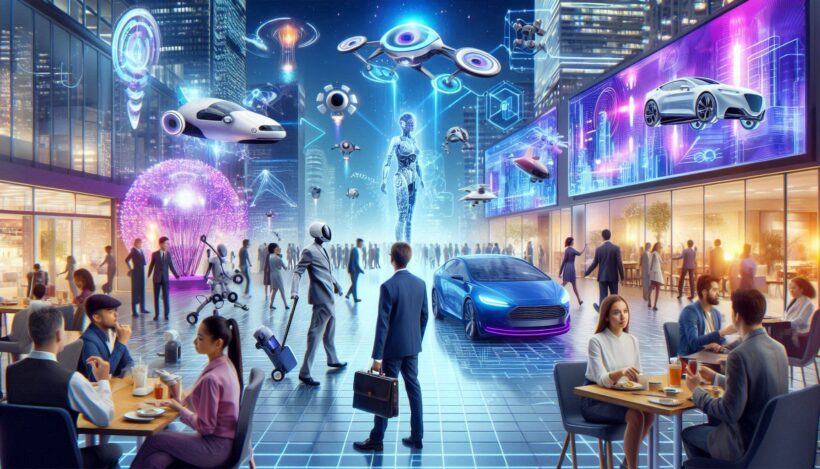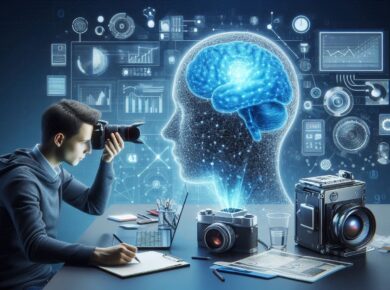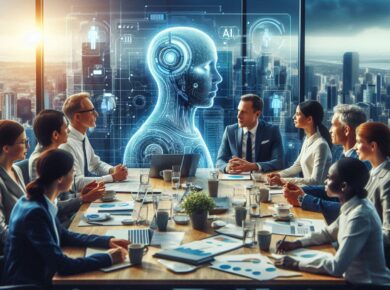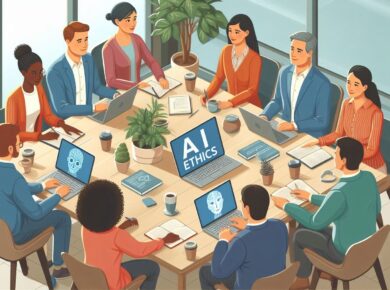Table of Contents
Artificial Intelligence (AI) has emerged as one of the most revolutionary technologies of our time, significantly altering the landscape of industries and the way we interact with the digital world. From enhancing customer service to driving automation in manufacturing, AI is not just a trend but a powerful tool that is shaping the future. This article delves into the world of AI, exploring its key components, applications, benefits, and challenges, and what it means for the future of technology.
What is Artificial Intelligence?
Artificial Intelligence refers to the simulation of human intelligence processes by machines, particularly computer systems. These processes include learning (the acquisition of information and rules for using it), reasoning (using rules to reach approximate or definite conclusions), and self-correction. AI can be categorized into two main types:
- Narrow AI:
Also known as weak AI, it refers to AI systems designed to perform a narrow task, such as facial recognition or internet searches. Most current AI applications fall into this category. - General AI:
Also referred to as strong AI, it is a theoretical form of AI that possesses the ability to understand, learn, and apply intelligence across a broad range of tasks, similar to a human.
Key Technologies Behind AI
The functionality of AI relies on various underlying technologies, including:
1. Machine Learning (ML)
Machine Learning is a subset of AI that enables systems to learn from data, identify patterns, and make decisions with minimal human intervention. ML algorithms are employed in various applications, from recommendation systems to fraud detection.
2. Natural Language Processing (NLP)
NLP allows computers to understand, interpret, and respond to human language in a meaningful way. This technology powers virtual assistants like Siri and Alexa, enabling them to comprehend spoken commands and provide relevant responses.
3. Computer Vision
Computer Vision enables machines to interpret and make decisions based on visual data from the world around them. This technology is used in self-driving cars, facial recognition software, and medical image analysis.
4. Robotics
AI is integrated into robotics to create autonomous machines capable of performing complex tasks. From industrial robots to drones, AI enhances the functionality and efficiency of these devices.
Applications of AI in Various Industries
AI technology is being adopted across numerous sectors, leading to increased efficiency and innovation. Here are some notable applications:
1. Healthcare
AI is revolutionizing healthcare through predictive analytics, personalized medicine, and robotic surgeries. AI algorithms can analyze medical data to predict patient outcomes, leading to better treatment plans.
2. Finance
In the finance sector, AI is utilized for algorithmic trading, risk management, and fraud detection. Financial institutions leverage AI to process vast amounts of data and make informed decisions in real-time.
3. Retail
AI enhances customer experiences in retail through personalized recommendations and chatbots that assist customers. Retailers use AI to analyze consumer behavior and optimize inventory management.
4. Transportation
Self-driving cars are a prominent example of AI in transportation. These vehicles rely on AI to navigate and make decisions based on real-time data from their environment.
5. Education
AI can personalize learning experiences, adapt content to individual learning speeds, and automate administrative tasks, thus enhancing educational outcomes for students.
Benefits of AI Technology
The integration of AI technology into various sectors offers numerous advantages:
1. Increased Efficiency
AI systems can process information and perform tasks significantly faster than humans, leading to improved productivity and efficiency across industries.
2. Cost Reduction
By automating routine tasks, businesses can reduce operational costs and allocate resources more effectively, enabling them to focus on strategic initiatives.
3. Enhanced Decision-Making
AI can analyze vast amounts of data quickly, providing insights that enable organizations to make informed decisions, predict trends, and identify opportunities.
4. Improved Customer Experience
With AI-driven tools like chatbots and personalized recommendations, businesses can enhance customer interactions, leading to increased satisfaction and loyalty.
Challenges and Ethical Considerations
While AI offers many benefits, it also presents challenges that must be addressed:
1. Data Privacy
The collection and analysis of large amounts of personal data raise significant privacy concerns. Organizations must ensure they comply with data protection regulations to safeguard user information.
2. Job Displacement
The automation of tasks traditionally performed by humans could lead to job displacement in certain sectors. It is essential to focus on reskilling and upskilling the workforce to adapt to the changing job landscape.
3. Bias in AI Systems
AI algorithms can inadvertently perpetuate biases present in the data they are trained on, leading to unfair outcomes. It is crucial to implement measures that promote fairness and transparency in AI development.
4. Security Risks
As AI systems become more prevalent, they also become targets for cyberattacks. Ensuring the security of these systems is vital to prevent unauthorized access and misuse.
Conclusion
The world of AI represents a transformative force in technology, with the potential to revolutionize industries and enhance our daily lives. As AI continues to evolve, its applications will expand, creating opportunities for innovation and efficiency. However, it is essential to address the associated challenges and ethical considerations to harness the full potential of AI responsibly. By doing so, we can ensure that this technology not only drives progress but also benefits society as a whole.






